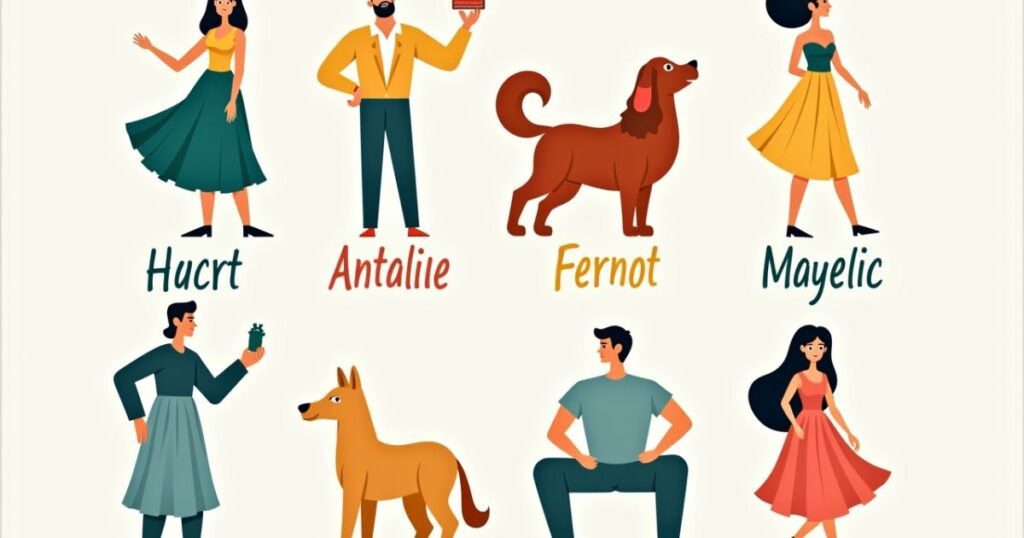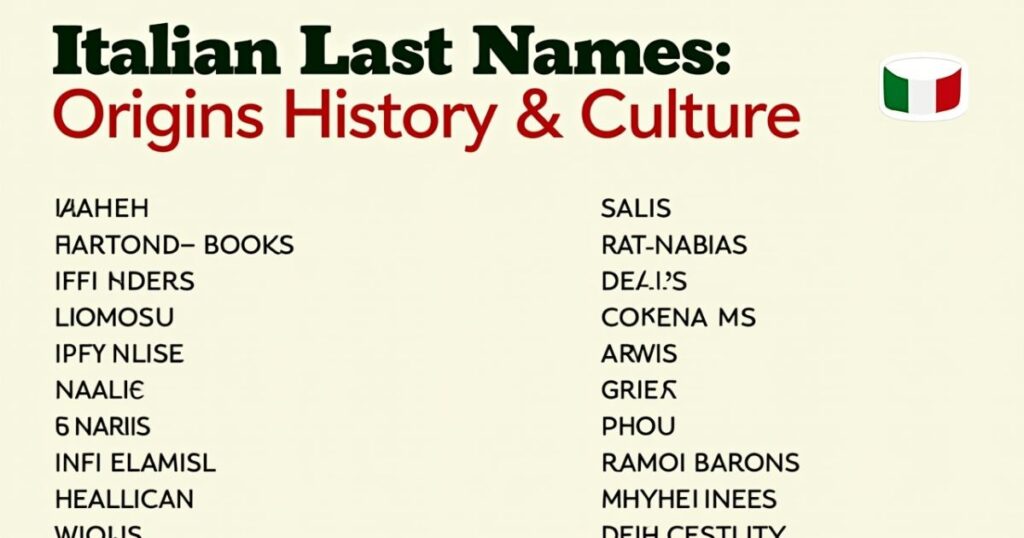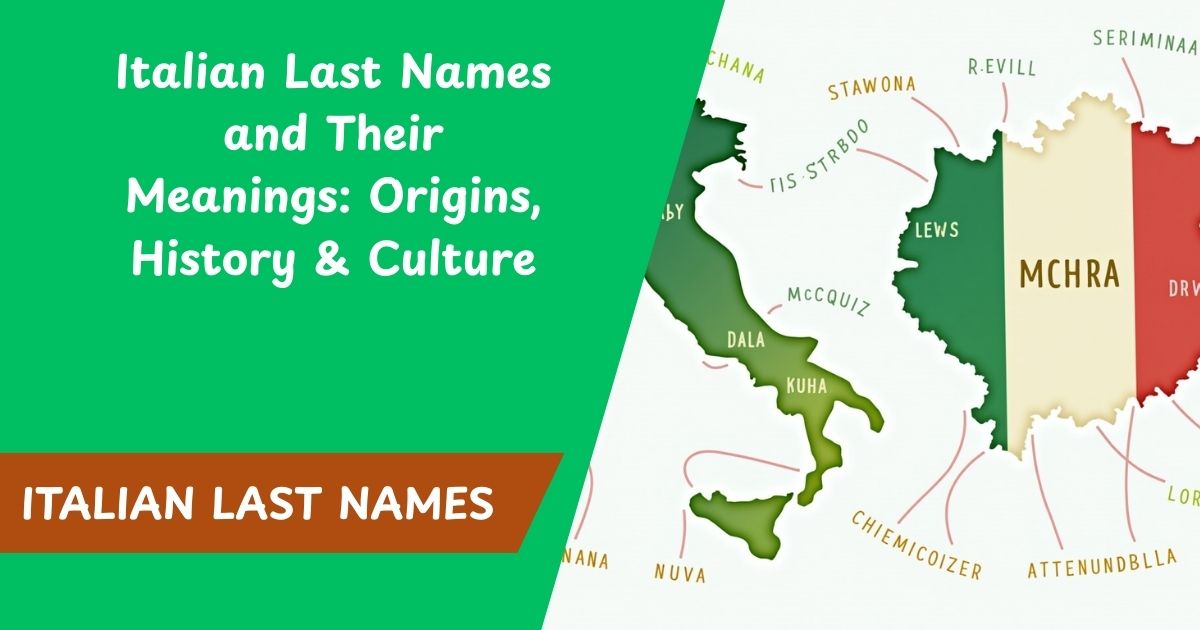Italian last names and their meanings: discover origins, history & culture in a journey that ties family, tradition, and pride together.
From wealthy Italian surnames to unique Italian surnames, each one tells a story pf survival, migration, and identify. Rooted in the Roman Empire, shaped by the Middle Ages, and spread across Europe and America, these names hold timeless value.
Whether you explore Italian surnames A-Z, trace old Italian last names, or research Italian American last names, each opens a window into heritage.
What Makes Italian Last Names Unique?
Italian surnames are more than just names; they are a mirror of history and culture. Unlike many countries where surnames developed much later, Italians began using them during the Roman Empire. These names carried clues about a person’s job, where they lived, or their family background.
For example, Ferrari means “blacksmith,” while Romano refers to someone from Rome. Gentile highlights personality, meaning “kind.”
Another unique feature is how lineage is honored. Names with prefixes like Di-, De-, D’-, or La- show family roots. For instance, D’Amico means “son of a friend,” and DeLuca means “of Luca.”
When Italians migrated to places like New York, Chicago, Boston, and Philadelphia, many names shifted slightly in spelling but kept their core meaning. Today, you’ll find both old Italian last names and their modern Italian American forms coexisting.
Comparing with Indian surnames also shows cultural richness. Just like Sharma (protector) or Patel (village headman) reflect heritage in India, Esposito or Russo tell stories of Italy’s social and cultural life.
The History of Italian Surnames

Early Roots and Traditions
The origin of Italian surnames goes back thousands of years. During the Roman Empire, citizens often used three-part names: praenomen (first name), nomen (clan name), and cognomen (nickname). For example, Julius Caesar followed this system.
As the Middle Ages began, Italy’s population grew, and first names alone weren’t enough to tell people apart. Communities began using extra identifiers like jobs, nicknames, or locations. Someone called Giovanni might become Giovanni Romano if he came from Rome, or Giovanni Ferraro if he worked as a blacksmith.
How Names Changed Over Time
Over centuries, names transformed with language, dialect, and politics. The Renaissance brought more structure, making surnames permanent. By the Age of Enlightenment, records like church documents and census surveys showed fixed family names.
With migration to America, many names were shortened or changed. For example:
- Di Benedetto became Benedetti in New Jersey.
- Esposito stayed common in New York and Boston, while Ricci spread across Chicago.
This is similar to Indian surname etymology, where names evolved across centuries — from ancient Indian surnames tied to dynasties to modern Indian family names influenced by language and caste.
Common Origins of Italian Last Names
Italian surnames usually come from one of four sources.
Based on Family and Lineage
Family-based surnames honor ancestors. Examples include:
- DiMaggio – son of Majo
- D’Angelo – son of Angelo
- DeSantis – descendant of Santo
Inspired by Places and Regions
Toponymic surnames reflect where families lived:
- Romano – from Rome
- Pisano – from Pisa
- Tarantino – from Taranto
- Lombardi – from Lombardy
From Jobs and Professions
Work-based surnames are very common:
- Ferrari – blacksmith
- Caruso – apprentice
- Conte/Conti – count or nobleman
- Pesci – fisherman
Rooted in Personal Traits and Nicknames
Some names reflect physical or personality traits:
- Russo – red-haired
- Ricci – curly-haired
- Gentile – kind or noble
- Grasso – fat or heavy
These patterns mirror Indian surnames like Gupta (protector/warrior) or Sharma (joy/protection), where jobs, traits, and ancestry shaped naming traditions.
Popular Italian Last Names and Their Meanings

Here’s a deeper A–Z list of Italian surnames with meanings:
Top A–C Italian Surnames
- Abate – priest
- Adami – son of Adam
- Ajello – little field
- Alberti – noble, bright
- Amato – beloved
- Bianchi – white or fair
- Bruno – brown-haired or dark-skinned
- Barone – baron or noble
- Colombo – dove, symbol of peace
- Capone – big-headed (nickname, also Al Capone family roots)
- Carbone – coal worker
D–H: Names with Rich Histories
- D’Amico – friend
- D’Angelo – angelic
- DeLuca – son of Luca
- Esposito – abandoned child (historic orphan name)
- Ferrari – blacksmith
- Farina – flour maker
- Fiore – flower
- Gallo – rooster (symbol of pride)
- Gentile – noble, kind
- Greco – Greek
I–N: Unique and Traditional Picks
- Lombardi – from Lombardy
- Longo – tall or long
- Marino – of the sea
- Morelli – dark-skinned
- Monti – from the mountains
- Napolitano – from Naples
- Neri – black-haired
O–Z: Strong, Timeless Italian Names
- Orlando – famous land
- Pagano – country dweller
- Pisano – from Pisa
- Ricci – curly-haired
- Romano – from Rome
- Rossi – red-haired
- Russo – red or ruddy
- Silvestri – forest dweller
- Tarantino – from Taranto
- Vinci – from Vinci (Leonardo da Vinci)
Regional Differences in Italian Last Names
Northern Italy
- Fontana – fountain or spring
- Alberti – noble lineage
- Costa – coast or slope
Central Italy
- Romano – from Rome
- Fiorentino – from Florence
- Toscano – from Tuscany
Southern Italy & Sicily
- Esposito – orphaned child
- Greco – of Greek origin
- Amato – beloved
These differences reflect geography, trade, and culture. Just as regional Indian surnames differ (Punjabi, Bengali, Tamil), Italian names change across regions.
Famous Italians and Their Last Names

- Leonardo da Vinci – “from Vinci” in Tuscany
- Sophia Loren – stage surname inspired by her heritage
- Joe DiMaggio – New York Yankees legend
- Enzo Ferrari – founder of Ferrari cars
- Frank Sinatra – Italian American singer from New Jersey
How Italian Last Names Influence Modern Culture
Italian surnames shine in Hollywood, sports, and politics. From Robert De Niro to Sylvester Stallone, these names keep Italian identity alive in America.
The U.S. Census Bureau (2015 National Community Survey) shows Italian American last names ranking high in states like New Jersey, Connecticut, and New York.
Tips for Tracing Your Italian Family Name
- Start with Italian surnames A–Z databases.
- Use church and parish records in Italy.
- Check U.S. Census Bureau and Ellis Island immigration lists.
- Compare old spellings with modern Italian American last names.
- Visit ancestral towns in Rome, Naples, or Florence for deeper research.
Final Thoughts: The Legacy of Italian Last Names
From old Italian last names rooted in the Middle Ages to unique Italian surnames shaping modern identity, each carries history, culture, and pride.
Whether tied to wealth, jobs, or family origins, these names connect generations across Italy, Europe, and America. Exploring the origin of Italian surnames lets families rediscover their roots and keep traditions alive.
From wealthy Italian surnames to Italian American last names, the legacy continues. Truly, Italian last names and their meanings: discover origins, history & culture remain timeless.

